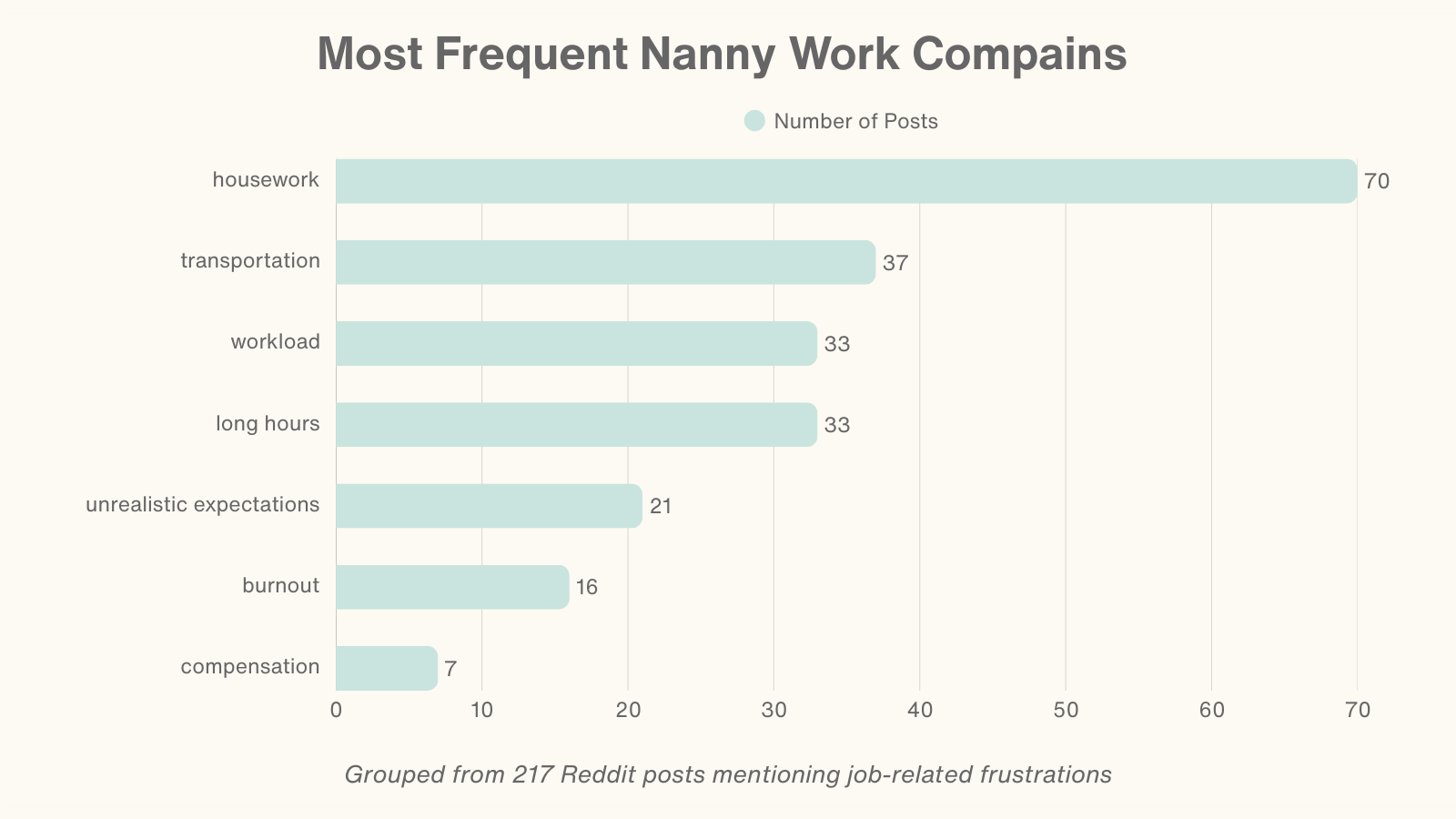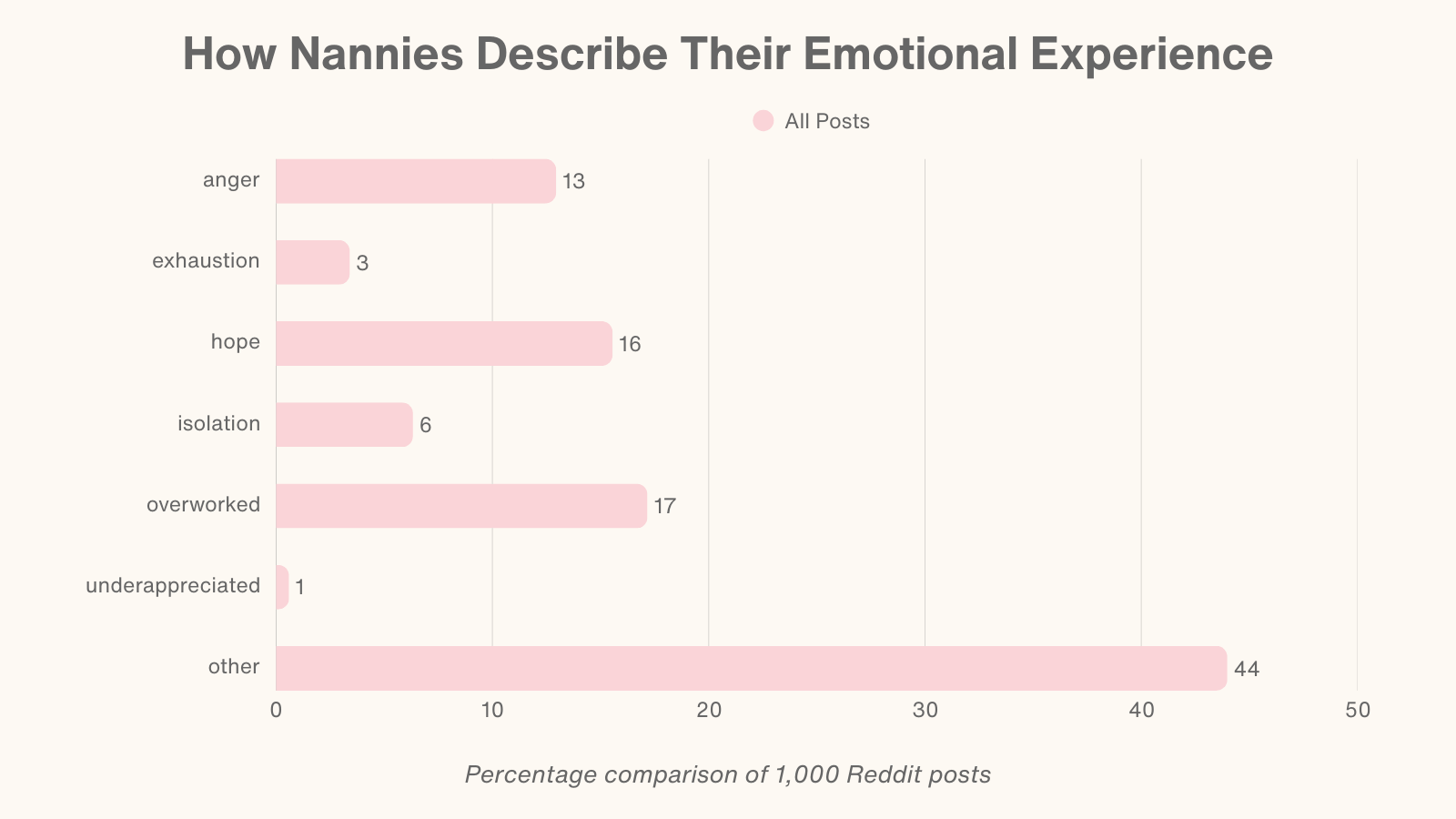
The Invisible Caregiver:
What Nannies Are Really Saying Online
Listen to This Post
I analyzed over 1,000 Reddit posts from nannies to uncover what they’re really feeling, and it’s not just about pay.
When we talk about childcare, the spotlight usually lands on the children. Occasionally, it shifts to the parents. But rarely, if ever, does it focus on the caregiver. And when it does, it’s often reduced to surface-level praise: “We’re so lucky to have you.”
But luck isn’t a work condition. Behind the scenes, nannies are navigating intense, emotionally loaded jobs, often without the protections or respect afforded to other professionals. To understand what’s really going on, I analyzed over 1,000 Reddit posts written by nannies. I wasn’t just looking for complaints, I was scanning for patterns, recurring narratives, and the emotional undercurrent running through their everyday stories.
The Most Common Complaints
Across posts, a few themes came up again and again. But here’s what may surprise you: compensation was actually the least mentioned issue. Instead, nannies talked most frequently about:
- Housework they weren’t hired to do
- Transportation burdens (like unpaid use of their own vehicle at workplace or long commutes)
- Workload creep, where new responsibilities constantly kept being added
- Long hours without breaks
- Unrealistic expectations from parents
- Burnout that no one takes seriously
- And finally, yes, compensation: often delayed, inconsistent, and filled with unexpected days off, with no explanation or acknowledgment

The picture is clear: while money matters, respect and boundaries matter more. Many nannies know the broader struggles of domestic work but what stings the most is being undervalued, especially while constantly hearing: “You’re part of our family.”
What’s your most common complaint as a nanny?
Current Results:
The Emotional Landscape
These posts weren’t just logistical, they were emotional. I tracked the most common feelings expressed, and here’s what stood out:
- Overworked was the most dominant theme, a sense of constantly being stretched beyond what’s fair
- Surprisingly, hope was second, proof that even in tough situations, nannies are deeply invested in their work and want to make it work not that just do the work
- Anger showed up often, especially when boundaries were crossed or safety was ignored
- Isolation was a frequent undertone, especially for live-in nannies or those caring for infants alone
- And exhaustion was a constant companion: physical, emotional, and moral fatigue

This emotional data matters. It reminds us that behind every smile, lullaby, or sleep schedule is a person navigating complex pressures with little systemic support.
Here’s how some nannies described those emotions in their own words:

Why This Matters
Nannies often work in an intimate but vulnerable role, deeply involved in a child’s life, yet lacking the power to speak up when something feels off. Many are afraid to raise concerns out of fear they’ll lose their job, their income, or the references crucial for their next position. This imbalance of power makes it easy to burnout, overwork and for the resentment to build quietly in the background.
But the impact doesn’t stop with the caregiver.
When a nanny is unsupported, exhausted, or pushed beyond their limits, the child also suffers. Emotional stability, patience, and presence, are all essential for quality caregiving, yet fade away when the work environment isn’t sustainable.
Parents who listen, invite feedback, and respect clear boundaries create not only a better workplace, but a better home. And that benefits everyone, especially the children.
More Caregiver Experience

Caregiver Experience
Aging Out as a Nanny: What Comes Next?
There’s no right time to leave nannying, only the right time for you, and that choice can lead anywhere.

Caregiver Experience
When Parents Undermine Your Expertise
How to advocate for yourself when your judgment isn’t trusted. Learn how small daily choices shape bigger challenges for kids, families, and caregivers alike.

Caregiver Experience
When the Nanny and the Mom Are Both Wondering If It’s Too Late
A data-informed look at fertility, age, and the quiet overlap between mothers and the women they hire.
If this post resonated with you, check our free Burnout Toolkit below, it's made specifically for nannies navigating tough seasons.

Written by Sylwia Glinska
Founder of Bottles & Bytes • Nanny, Newborn Care Specialist & Childcare Consultant
Get To Know Me